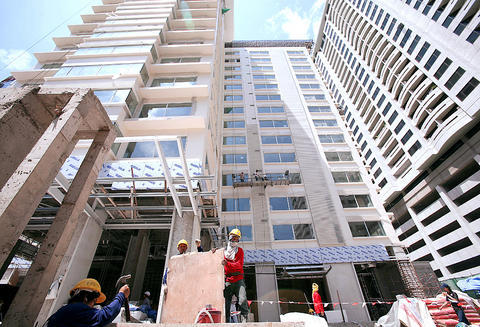With consumers feeling gloomy over the outlook of post-coup Thailand, the kingdom's nearly US$6 billion housing market has shrunk for the first time since 2000, industry experts say.
"People are delaying buying property due to a lack of confidence in the economy and politics," said Atip Bijanonda, president of the Thai Condominium Association.
Sales in the residential property market, worth 200 billion baht (US$5.8 billion), dropped by 10 billion baht in the four months to last month, marking the first decline since 2000, the association said.

PHOTO: AFP
The figure has rattled the industry, which saw demand nosediving during the 1997 Asian financial crisis.
Atip said he expected more bad news with Thai consumer confidence stuck at a five-year low.
"The market may have negative growth this year," he said.
To shore up housing demand, the military-installed government, which came to power after a coup last September, is expected to launch measures aimed at reviving the property sector, including tax cuts.
Pimonwan Mahujchariyavong, a property analyst at Kasikorn Research Center, said consumers were putting off buying property as they awaited a further cut in the key interest rate.
"Consumers are expecting gains from falling interest rates and they are waiting for the rate to go down further," Pimonwan said.
The Bank of Thailand slashed its key interest rate by a half-point to 3.5 percent last week in a bid to spur sluggish consumer spending and the slowing economy.
It was the fourth rate cut this year but business leaders called on the central bank to lower the rate more aggressively in an effort to stimulate the economy, which is seen rising 3.8 to 4.8 percent this year.
If growth was just 3.8 percent this year, it would mark the lowest increase since 2001, when Thailand's GDP expanded 2.2 percent.
With flagging finances and political uncertainty under the military government, the number of new housing projects has fallen as some 90,000 houses and condos remain unsold in the market, Pimonwan said.
"The property market has slumped significantly since the beginning of this year because of shrinking confidence in the economy among developers as well as consumers," she said.
Longlom Bunnag, chairman of real estate management firm Jones Lang LaSalle Thailand, agreed.
"The slow growth of demand that the market is experiencing now is largely due to a lack of consumer and investor confidence rather than a decline in spending power," he said in a statement.
But Longlom said anticipated elections will likely see sales pick up later this year.
"We expect demand to recover in late 2007 or early 2008, once the political uncertainty is clear following the new election scheduled for December this year," he said.

MORE VISITORS: The Tourism Administration said that it is seeing positive prospects in its efforts to expand the tourism market in North America and Europe Taiwan has been ranked as the cheapest place in the world to travel to this year, based on a list recommended by NerdWallet. The San Francisco-based personal finance company said that Taiwan topped the list of 16 nations it chose for budget travelers because US tourists do not need visas and travelers can easily have a good meal for less than US$10. A bus ride in Taipei costs just under US$0.50, while subway rides start at US$0.60, the firm said, adding that public transportation in Taiwan is easy to navigate. The firm also called Taiwan a “food lover’s paradise,” citing inexpensive breakfast stalls

TRADE: A mandatory declaration of origin for manufactured goods bound for the US is to take effect on May 7 to block China from exploiting Taiwan’s trade channels All products manufactured in Taiwan and exported to the US must include a signed declaration of origin starting on May 7, the Bureau of Foreign Trade announced yesterday. US President Donald Trump on April 2 imposed a 32 percent tariff on imports from Taiwan, but one week later announced a 90-day pause on its implementation. However, a universal 10 percent tariff was immediately applied to most imports from around the world. On April 12, the Trump administration further exempted computers, smartphones and semiconductors from the new tariffs. In response, President William Lai’s (賴清德) administration has introduced a series of countermeasures to support affected

CROSS-STRAIT: The vast majority of Taiwanese support maintaining the ‘status quo,’ while concern is rising about Beijing’s influence operations More than eight out of 10 Taiwanese reject Beijing’s “one country, two systems” framework for cross-strait relations, according to a survey released by the Mainland Affairs Council (MAC) on Thursday. The MAC’s latest quarterly survey found that 84.4 percent of respondents opposed Beijing’s “one country, two systems” formula for handling cross-strait relations — a figure consistent with past polling. Over the past three years, opposition to the framework has remained high, ranging from a low of 83.6 percent in April 2023 to a peak of 89.6 percent in April last year. In the most recent poll, 82.5 percent also rejected China’s

PLUGGING HOLES: The amendments would bring the legislation in line with systems found in other countries such as Japan and the US, Legislator Chen Kuan-ting said Democratic Progressive Party (DPP) Legislator Chen Kuan-ting (陳冠廷) has proposed amending national security legislation amid a spate of espionage cases. Potential gaps in security vetting procedures for personnel with access to sensitive information prompted him to propose the amendments, which would introduce changes to Article 14 of the Classified National Security Information Protection Act (國家機密保護法), Chen said yesterday. The proposal, which aims to enhance interagency vetting procedures and reduce the risk of classified information leaks, would establish a comprehensive security clearance system in Taiwan, he said. The amendment would require character and loyalty checks for civil servants and intelligence personnel prior to